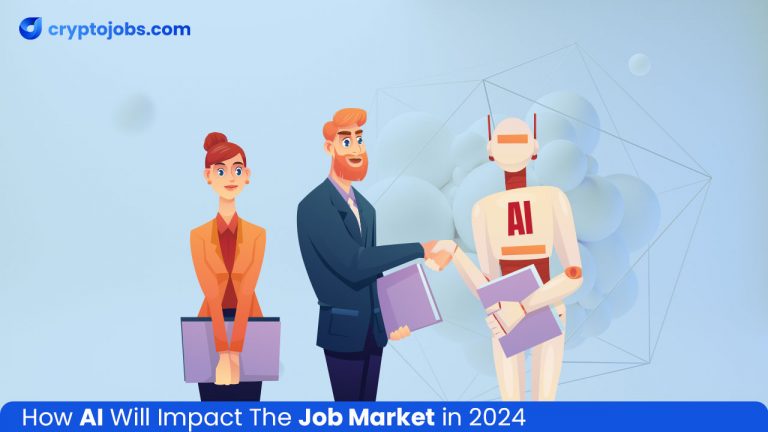
How AI Will Impact the Job Market in 2024
- cryptojobs.com
- March 11, 2024
- All Posts, Blockchain, Web3
- 0 Comments
Artificial Intelligence (AI) is the simulation of a human brain. The initial idea was to build a machine that could think and act like a human. This, however, is yet to be achieved, but we do have powerful computer programs that are designed to streamline and automate many processes. The impact of AI can be felt across all industries. How is this impacting the job market? Is it already replacing human workers? Or do we still have a chance? Let’s find out!
Rise of AI
The idea of thinking machines has been around since the 1930s. It took a long time to fulfill when, with advanced machine learning techniques and big data, scaled large-language models were developed.
Today, these similar models are revolutionizing our world. Language models such as ChatGPT are powering processes like support, data analysis, and general assistance. Google’s new AI model can build presentations, write content, and analyze and enter data. And these two are not the only ones. There are many other AI tools that are transforming our way of working. So, what is the future outlook? We believe it to be bright for those who are quick to get on the bandwagon.
AI’s Influence on Recruitment
AI’s impact can most prominently be felt in recruitment practices. It has become a popular strategy to optimize hiring processes. The human resource (HR) departments are using AI technology to scan through mountains of resumes, identify top candidates, and conduct initial screenings. This departure from traditional practices mitigated decision fatigue and expedited hiring.
However, experts caution that while implementing AI technologies, companies must be vigilant in programming their algorithms, especially in the Web3 job market, where inherent biases will be against its vision of equality.
In 2024, with the job market evolving, candidates and employees are also making use of AI to give themselves an advantage. These days, an average job seeker can easily access AI-powered tools to build resumes, generate cover letters, analyze LinkedIn profiles, and track various job applications. And this trend will only gain more traction as time goes by.
Job Killer or Redefiner
Just like with any controversial topic, there is a huge debate surrounding the role of AI in transforming the job market. Many industry experts maintain that it will bring about a positive change by enhancing productivity and streamlining operations. Others regard it as a disruptive force that serves to steal jobs. While the jury is not yet out on the case, we can safely say that AI is solving many complex problems and easing our lives in many ways. The balance is tipping in Al’s favor as we witness it redefining roles in the Web3 job market. By automating repetitive tasks, it eliminates inconsistencies, errors, and fatigue. That, too, with minimum human intervention. But this doesn’t mean it is undermining human effort in any way. No matter how efficient and capable artificial intelligence becomes, it can still only address simple stuff compared to what we humans can handle.
AI Will Create New Opportunities
The digital world is undergoing a major technological upheaval. With blockchain technology and Web3 taking over, many career avenues have opened up for individuals skilled in these technologies. Contrary to its image as a job thief, AI is creating new job opportunities, too. As companies integrate to improve efficiency and automate their operations, they also seek individuals to oversee it. This means the demand for data scientists, software engineers, machine learning engineers, and other specialized personnel will surge.
Negative Repercussions
Unfortunately, working alongside AI will have some negative effects too. The major one is increased layoffs. According to a survey ResumeBuilder recently conducted, 44% of companies expect layoffs in 2024 due to AI integration. While the numbers are disheartening, it should be noted that these layoffs will be largely related to simple tasks or daily business activities. 83% of the participants also said that learning AI will actually help them retain their positions.
What Jobs Can Be Taken Over By AI
Let’s talk about the jobs that are likely to be automated with AI. Customer care is the one area where AI might have the maximum impact. Most of the queries customers ask, or the problems they encounter are repetitive. Responding to such inquiries doesn’t require a high level of social or emotional intelligence. That’s why the human employees manning the phone lines are likely to be replaced by AI-powered chatbots.
Similarly, companies are also replacing receptionists with robots. These machines not only communicate with visitors in person, but they can also take calls and create memos.
AI is also transforming bookkeeping practices. It provides a secure and flexible accounting system with a cloud-based service. The system relies on AI algorithms to ensure proper collection, storage, and analysis of data. Warehouse workers, retail employees, and salespeople might also face this threat as basic automation and artificial implementation take over their positions. So, people who are working these jobs should quickly begin developing new skills.
Which jobs Can’t Be Replaced by AI?
While AI threatens many jobs, there are some roles that AI can’t replace. They can’t replace teachers because they are inspirational figures. Behind successful leaders are good teachers who inspired them to be what they are today.
Similarly, the position of lawyers and judges has a strong component of case analysis, strategy, and negotiation. Certain skills are required to navigate the complex justice system. Besides, personal experience and knowledge also come into play. All of these factors are too human for AI to take over.
HR professionals can also breathe a sigh of relief. Although AI assists in HR processes, it can’t keep the employees as motivated and organized as a human manager can. The jobs of healthcare workers and artistic expressions are also safe.
Will the Shift be Instant
We believe not. And Pew Research reports agree with us. No matter how alarming the situation seems, it might still take about half a century or more for a complete transition to AI. Sure, the change is coming, and many will face layoffs, but it is not going to happen within a matter of months. So, upskill yourself and learn AI as it is the future.
Finding Web3 jobs in the competitive web3 space can be stress-free with cryptojobs.com, as top Web3 and crypto companies trust the platform for hiring the best talent. Start your job search today and find a position that matches your skillset.




